(完整版)英语中介词的用法
介词用法总结

介词用法总结介词是连接词与词之间关系的一类虚词,它在句子中起到链接作用,并且具有一定的语法功能。
正确地使用介词可以使句子更加准确、清晰。
在英语中,有许多常用的介词,本文将对其中的一些常见介词及其用法进行总结。
一、介词用于表示地点和位置1. in:表示在某个范围或地点之内Examples:- The book is in the bag.- She lives in New York.2. at:表示在某个具体的地点Examples:- We met at the park.- He works at the office.3. on:表示在某个表面或者位置上Examples:- The cat is sitting on the chair.- The picture is on the wall.二、介词用于表示时间1. on:表示某一天或日期Examples:- I have a meeting on Monday.- We will celebrate New Year's Day on January 1st.2. at:表示具体的时刻Examples:- The train will arrive at 8 o'clock.- Let's meet at noon.3. in:表示较长的时间段Examples:- She will go on vacation in the summer.- We usually have a family dinner in the evening.三、介词用于表示原因和目的1. for:表示目的Examples:- I bought a new dress for the party.- He is studying hard for the exam.2. because of:表示因果关系- The match was canceled because of the rain.- She couldn't come to the party because of her illness.四、介词用于表示方式和手段1. by:表示通过某种方式或手段Examples:- I go to work by bus.- The letter was sent by email.2. with:表示使用某物或与某人一起Examples:- She wrote the letter with a pen.- He went to the park with his friends.五、介词用于表示关系和比较1. of:表示某物的一部分、属于或由...组成Examples:- The first chapter of the book is interesting.- The house is made of bricks.2. to:表示所属关系或比较- The tail belongs to the dog.- He is taller than his brother.六、其他常用介词1. with:表示同伴或陪伴关系Examples:- I went to the movies with my friends.- She enjoys traveling with her family.2. without:表示没有某种情况或物品Examples:- I can't live without music.- He ate lunch without a fork.总结:介词在英语中起到非常重要的作用,它可以连接词与词之间的关系,使句子更加准确和流畅。
常见的英语介词的用法总结

常见的英语介词的用法总结常见的英语介词用法表示方位的介词:in, to, on表示计量的介词:at, for, by表示材料的介词:of, from, in表示工具或手段的介词:by, with, on表示关于的介词:of, about, on表示好像或当作的介词:like, as表示除某人某物外的介词:besides, excep介词用法口诀早、午、晚要用 in,at 黎明、午夜、点与分。
年、月、年月、季节、周,阳光、灯、影、衣、帽 in。
将来时态 in ... 以后,小处 at 大处 in。
有形 with 无形 by,语言、单位、材料 in。
特征、方面与方式,心情成语惯用 in。
介词 at 和 to 表方向,攻击、位置、恶、善分。
早、午、晚要用 in介词的种类(1) 简单介词:about, across, after, against, among, around, at, before, behind, below, beside, but, by, down, during, for, from, in, of, on, over, near, round, since, to, under, up, with等等。
(2) 合成介词:inside, into, outside, throughout, upon, without, within(3) 短语介词:according to, along with, apart from, because of, in front of, in spite of, instead of, owing to, up to, with reguard to(4) 分词介词:considering, reguarding, including, concerning 介词in的常见用法1.动词+ina)动词+ inbelieve in信任, break in碎成,bring in引起;产生;带来, call in 下令收回, fill in填充,get in收获, hand in上缴, involve in涉及, lie in 在于, result in导致, share in共享,succeed in成功, take in卷起;订阅, turn in归还当局。
介词英语的用法总结
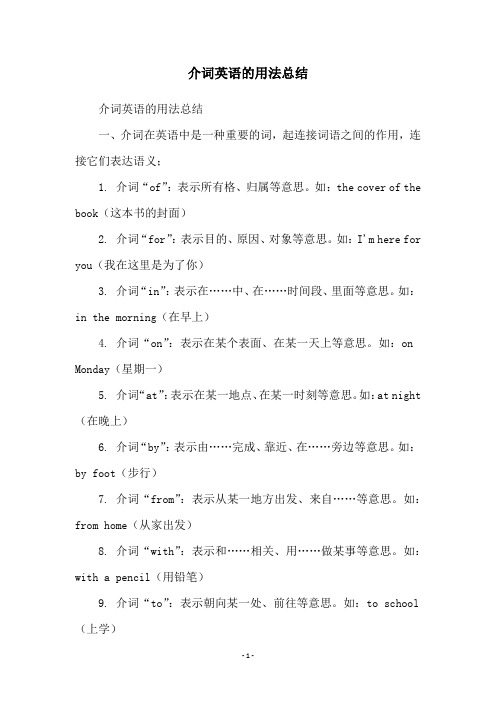
介词英语的用法总结介词英语的用法总结一、介词在英语中是一种重要的词,起连接词语之间的作用,连接它们表达语义;1. 介词“of”:表示所有格、归属等意思。
如:the cover of the book(这本书的封面)2. 介词“for”:表示目的、原因、对象等意思。
如:I'm here for you(我在这里是为了你)3. 介词“in”:表示在……中、在……时间段、里面等意思。
如:in the morning(在早上)4. 介词“on”:表示在某个表面、在某一天上等意思。
如:on Monday(星期一)5. 介词“at”:表示在某一地点、在某一时刻等意思。
如:at night (在晚上)6. 介词“by”:表示由……完成、靠近、在……旁边等意思。
如:by foot(步行)7. 介词“from”:表示从某一地方出发、来自……等意思。
如:from home(从家出发)8. 介词“with”:表示和……相关、用……做某事等意思。
如:with a pencil(用铅笔)9. 介词“to”:表示朝向某一处、前往等意思。
如:to school (上学)10.介词“for”:表示为了……、把……作为等意思。
如:for fun (为了好玩)11.介词“as”:表示作为、当……时等意思。
如:as a teacher (作为一个老师)12.介词“over”:表示在……上、穿过等意思。
如:over the bridge (过桥)13.介词“since”:表示从……起、既然等意思。
如:since then (从那时起)14.介词“into”:表示到……里面、转向等意思。
如:into the room(进房间)二、最后,需要强调的是,介词的使用要灵活搭配,以正确表达出英语句子的意思,以便达到更好的英语表达效果。
(完整版)介词用法总结
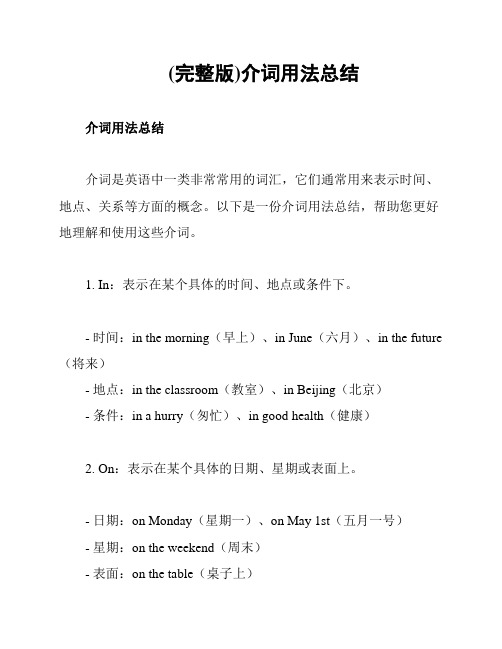
(完整版)介词用法总结介词用法总结介词是英语中一类非常常用的词汇,它们通常用来表示时间、地点、关系等方面的概念。
以下是一份介词用法总结,帮助您更好地理解和使用这些介词。
1. In:表示在某个具体的时间、地点或条件下。
- 时间:in the morning(早上)、in June(六月)、in the future (将来)- 地点:in the classroom(教室)、in Beijing(北京)- 条件:in a hurry(匆忙)、in good health(健康)2. On:表示在某个具体的日期、星期或表面上。
- 日期:on Monday(星期一)、on May 1st(五月一号)- 星期:on the weekend(周末)- 表面:on the table(桌子上)3. At:表示在某个具体的时间、地点或时刻。
- 时间:at 3 o'clock(三点钟)、at night(晚上)- 地点:at the park(公园)- 时刻:at the moment(此刻)4. By:表示通过某种方式或由某人完成某事。
- 方式:go to work by car(坐车上班)- 人:the book written by Mark Twain(马克·吐温所写的书)5. With:表示陪同、具备、使用等概念。
- 陪同:go shopping with friends(和朋友一起去购物)- 具备:a house with a garden(带有花园的房子)- 使用:write with a pen(用钢笔写)6. For:表示为了某个目的、期间或持续时间。
- 目的:study for the test(为考试研究)- 期间:wait for a while(等一会儿)- 持续时间:sleep for eight hours(睡八个小时)以上是介词的基本用法总结,希望对您有所帮助!。
介词的常见用法总结
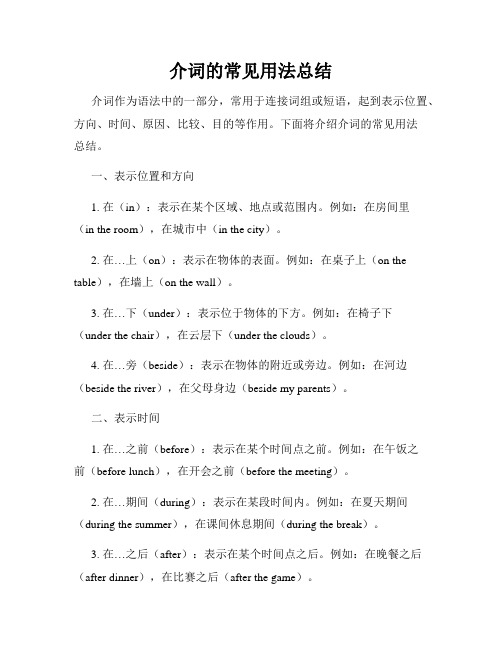
介词的常见用法总结介词作为语法中的一部分,常用于连接词组或短语,起到表示位置、方向、时间、原因、比较、目的等作用。
下面将介绍介词的常见用法总结。
一、表示位置和方向1. 在(in):表示在某个区域、地点或范围内。
例如:在房间里(in the room),在城市中(in the city)。
2. 在…上(on):表示在物体的表面。
例如:在桌子上(on the table),在墙上(on the wall)。
3. 在…下(under):表示位于物体的下方。
例如:在椅子下(under the chair),在云层下(under the clouds)。
4. 在…旁(beside):表示在物体的附近或旁边。
例如:在河边(beside the river),在父母身边(beside my parents)。
二、表示时间1. 在…之前(before):表示在某个时间点之前。
例如:在午饭之前(before lunch),在开会之前(before the meeting)。
2. 在…期间(during):表示在某段时间内。
例如:在夏天期间(during the summer),在课间休息期间(during the break)。
3. 在…之后(after):表示在某个时间点之后。
例如:在晚餐之后(after dinner),在比赛之后(after the game)。
三、表示原因1. 因为(because of):表示由于某个原因。
例如:因为天气原因(because of the weather),因为健康问题(because of health issues)。
2. 由于(due to):表示由于某种情况或原因。
例如:由于交通堵塞(due to traffic congestion),由于工作原因(due to work commitments)。
四、表示比较1. 像…一样(like):表示两个或多个事物在某些方面的相似性。
介词的用法归纳
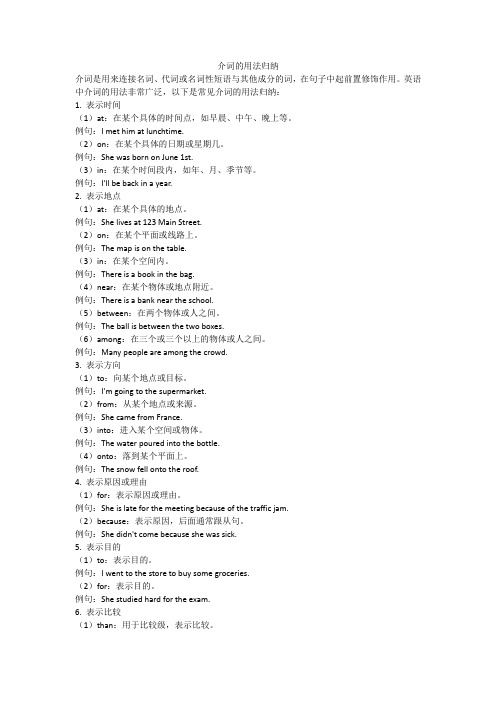
介词的用法归纳介词是用来连接名词、代词或名词性短语与其他成分的词,在句子中起前置修饰作用。
英语中介词的用法非常广泛,以下是常见介词的用法归纳:1. 表示时间(1)at:在某个具体的时间点,如早晨、中午、晚上等。
例句:I met him at lunchtime.(2)on:在某个具体的日期或星期几。
例句:She was born on June 1st.(3)in:在某个时间段内,如年、月、季节等。
例句:I'll be back in a year.2. 表示地点(1)at:在某个具体的地点。
例句:She lives at 123 Main Street.(2)on:在某个平面或线路上。
例句:The map is on the table.(3)in:在某个空间内。
例句:There is a book in the bag.(4)near:在某个物体或地点附近。
例句:There is a bank near the school.(5)between:在两个物体或人之间。
例句:The ball is between the two boxes.(6)among:在三个或三个以上的物体或人之间。
例句:Many people are among the crowd.3. 表示方向(1)to:向某个地点或目标。
例句:I'm going to the supermarket.(2)from:从某个地点或来源。
例句:She came from France.(3)into:进入某个空间或物体。
例句:The water poured into the bottle.(4)onto:落到某个平面上。
例句:The snow fell onto the roof.4. 表示原因或理由(1)for:表示原因或理由。
例句:She is late for the meeting because of the traffic jam.(2)because:表示原因,后面通常跟从句。
介词用法总结

介词用法总结介词是英语语法中一个重要的词类,用于表示名词、代词、动词和形容词等与其他词或短语之间的关系。
在不同的句子和语境中,介词具有不同的用法。
本文将对介词的用法进行总结,并提供相关的例句。
一、表示位置关系的介词1. in:在…之中,在(具体范围)。
例句:He is waiting in the car.(他正在车里等待。
)2. on:在…之上,在(水平面)。
例句:The book is on the table.(书在桌子上。
)3. at:在…地方,在(具体点)。
例句:She is studying at the library.(她在图书馆学习。
)4. by:在…旁边,靠近(某物)。
例句:He is standing by the door.(他站在门旁边。
)5. under:在…下面,在(某物)的底部。
例句:The cat is hiding under the bed.(猫在床下躲藏。
)6. between:在…之间(两者之间)。
例句:The restaurant is located between the bank and the supermarket.(这家餐厅位于银行和超市之间。
)二、表示时间关系的介词1. at:在(具体时间点)。
例句:She will meet her friend at 8 o'clock.(她将在8点钟见她的朋友。
)2. on:在(具体日期或星期)。
例句:I have a meeting on Monday.(星期一我有个会议。
)3. in:在(一段时间内)。
例句:He will travel to Europe in summer.(他将在夏天去欧洲旅行。
)4. during:在…期间,表示全程。
例句:I read a book during the flight.(我在飞行途中读了一本书。
)5. for:持续时间,表示时间段。
例句:They have been married for ten years.(他们已经结婚十年了。
史上超全的英语介词用法归纳总结!不看太可惜了
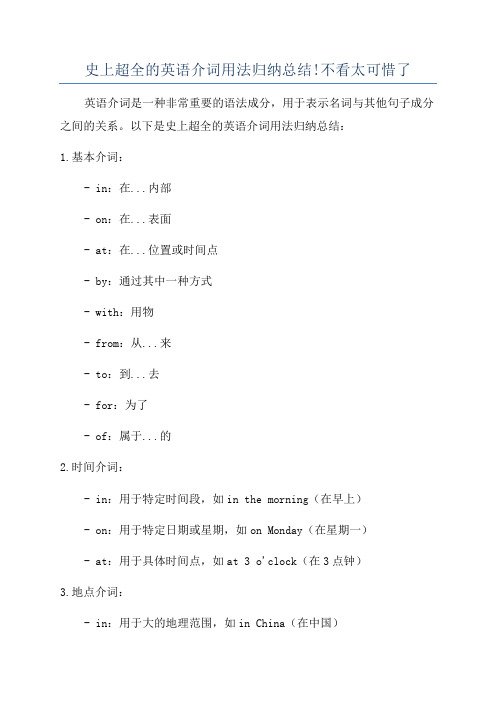
史上超全的英语介词用法归纳总结!不看太可惜了英语介词是一种非常重要的语法成分,用于表示名词与其他句子成分之间的关系。
以下是史上超全的英语介词用法归纳总结:1.基本介词:- in:在...内部- on:在...表面- at:在...位置或时间点- by:通过其中一种方式- with:用物- from:从...来- to:到...去- for:为了- of:属于...的2.时间介词:- in:用于特定时间段,如in the morning(在早上)- on:用于特定日期或星期,如on Monday(在星期一)- at:用于具体时间点,如at 3 o'clock(在3点钟)3.地点介词:- in:用于大的地理范围,如in China(在中国)- on:用于较小的地理范围或表面,如on the street(在街上)- at:用于具体地点,如at the supermarket(在超市)4.方向介词:- to:表示到达一些地方,如go to school(去学校)- into:表示进入一些地方,如go into the house(进入房子)- out of:表示离开一些地方,如get out of the car(离开车)5.原因介词:- because of:由于,如He is late because of the traffic(他因为交通堵塞而迟到)- due to:由于,如The flight was canceled due to bad weather(因为恶劣天气,航班被取消)6.动词短语介词:- look after:照顾,如She looks after her younger brother (她照顾她的弟弟)- take care of:照顾,如He takes care of his plants(他照顾他的植物)7.形容词短语介词:- interested in:对...感兴趣,如She is interested in music (她对音乐感兴趣)- good at:擅长...,如He is good at playing basketball(他擅长打篮球)8.其他常见介词用法:- with regard to:关于,如With regard to the matter, I have something to say(关于这件事,我有些话要说)- instead of:代替,如I will go instead of him(我将代替他去)- according to:根据,如According to the weather forecast, it will rain tomorrow(根据天气预报,明天会下雨)以上是一些常见的英语介词用法总结,希望能帮到你!。
英语介词的用法总结(完整版)
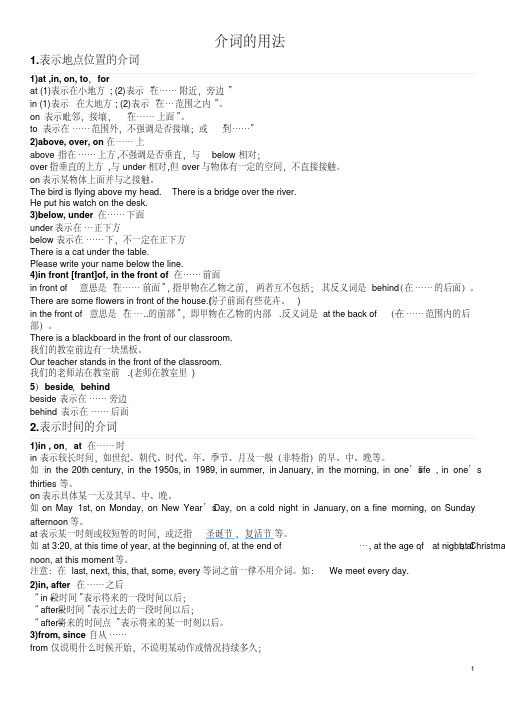
介词的用法1.表示地点位置的介词1)at ,in, on, to,forat (1)表示在小地方; (2)表示“在……附近,旁边”in (1)表示在大地方; (2)表示“在…范围之内”。
on 表示毗邻,接壤,“在……上面”。
to 表示在……范围外,不强调是否接壤;或“到……”2)above, over, on 在……上above 指在……上方,不强调是否垂直,与below相对;over指垂直的上方,与under相对,但over与物体有一定的空间,不直接接触。
on表示某物体上面并与之接触。
The bird is flying above my head. There is a bridge over the river.He put his watch on the desk.3)below, under 在……下面under表示在…正下方below表示在……下,不一定在正下方There is a cat under the table.Please write your name below the line.4)in front [frant]of, in the front of在……前面意思是“在……前面”,指甲物在乙物之前,两者互不包括;其反义词是behind(在……的后面)。
in front of…There are some flowers in front of the house.(房子前面有些花卉。
)in the front of 意思是“在…..的前部”,即甲物在乙物的内部.反义词是at the back of…(在……范围内的后部)。
There is a blackboard in the front of our classroom.我们的教室前边有一块黑板。
Our teacher stands in the front of the classroom.我们的老师站在教室前.(老师在教室里)5)beside,behindbeside 表示在……旁边behind 表示在……后面2.表示时间的介词1)in , on,at 在……时in表示较长时间,如世纪、朝代、时代、年、季节、月及一般(非特指)的早、中、晚等。
英语中常见介词用法总结
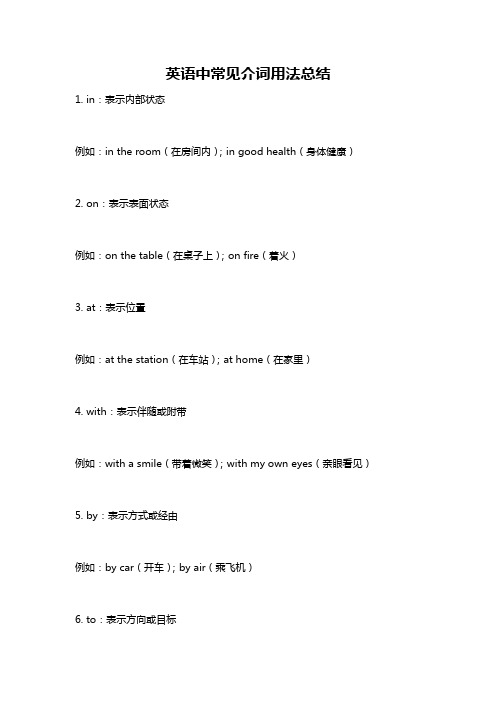
英语中常见介词用法总结
1. in:表示内部状态
例如:in the room(在房间内);in good health(身体健康)2. on:表示表面状态
例如:on the table(在桌子上);on fire(着火)
3. at:表示位置
例如:at the station(在车站);at home(在家里)
4. with:表示伴随或附带
例如:with a smile(带着微笑);with my own eyes(亲眼看见)5. by:表示方式或经由
例如:by car(开车);by air(乘飞机)
6. to:表示方向或目标
例如:to the park(去公园);to the moon(到月球)
7. from:表示出发地或来源
例如:from Beijing(来自北京);from the magazine(从杂志中)
8. for:表示目的或用途
例如:for a birthday party(为了生日派对);for writing(用于写作)
9. of:表示属于或关系
例如:the book of Harry Potter(哈利·波特的书);the sister of Mary(玛丽的姐姐)
10. with:表示具有或伴随
例如:a man with a gun(拿着枪的人);a girl with long hair(长发女孩)。
(完整word版)介词用法归纳,推荐文档
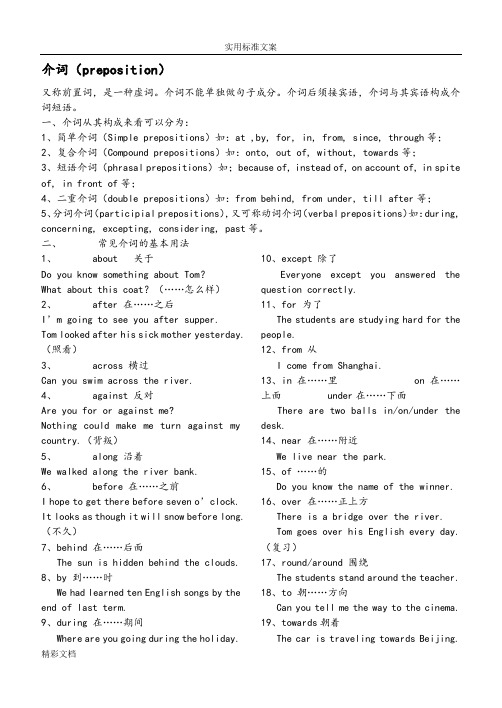
介词(preposition)又称前置词,是一种虚词。
介词不能单独做句子成分。
介词后须接宾语,介词与其宾语构成介词短语。
一、介词从其构成来看可以分为:1、简单介词(Simple prepositions)如:at ,by, for, in, from, since, through等;2、复合介词(Compound prepositions)如:onto, out of, without, towards等;3、短语介词(phrasal prepositions)如;because of, instead of, on account of, in spite of, in front of等;4、二重介词(double prepositions)如:from behind, from under, till after等;5、分词介词(participial prepositions),又可称动词介词(verbal prepositions)如:during, concerning, excepting, considering, past等。
二、常见介词的基本用法1、 about 关于Do you know something about Tom?What about this coat?(……怎么样)2、 after 在……之后I’m going to see you after supper. Tom looked after his sick mother yesterday.(照看)3、 across 横过Can you swim across the river.4、 against 反对Are you for or against me?Nothing could make me turn against my country.(背叛)5、 along 沿着We walked along the river bank.6、 before 在……之前I hope to get there before seven o’clock. It looks as though it will snow before long.(不久)7、behind 在……后面The sun is hidden behind the clouds.8、by 到……时We had learned ten English songs by the end of last term.9、during 在……期间Where are you going during the holiday. 10、except 除了Everyone except you answered the question correctly.11、for 为了The students are studying hard for the people.12、from 从I come from Shanghai.13、in 在……里 on 在……上面 under在……下面There are two balls in/on/under the desk.14、near 在……附近We live near the park.15、of ……的Do you know the name of the winner.16、over 在……正上方There is a bridge over the river.Tom goes over his English every day.(复习)17、round/around 围绕The students stand around the teacher.18、to 朝……方向Can you tell me the way to the cinema.19、towards朝着The car is traveling towards Beijing.20、with 和……一起me?Would you like to go to the cinema with学习这些介词时可以先记住它的汉语意思,然后参照例句来加深理解,并在今后的学习中加以灵活运用。
(完整版)英语中介词的用法以及动词的用法讲解
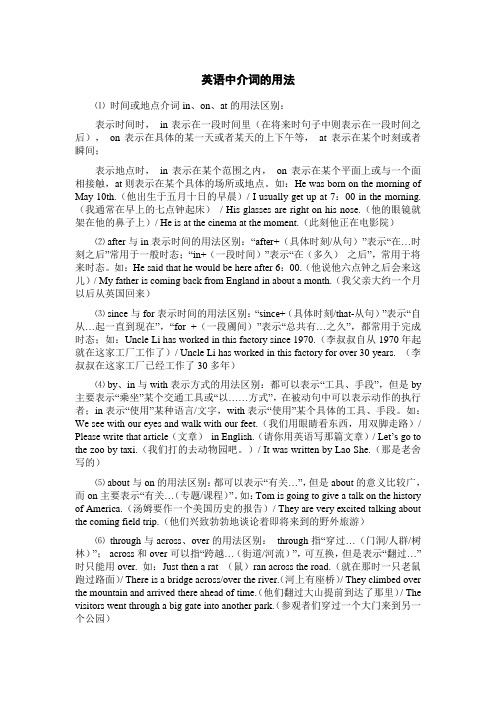
英语中介词的用法⑴时间或地点介词in、on、at的用法区别:表示时间时,in表示在一段时间里(在将来时句子中则表示在一段时间之后),on表示在具体的某一天或者某天的上下午等,at表示在某个时刻或者瞬间;表示地点时,in表示在某个范围之内,on表示在某个平面上或与一个面相接触,at则表示在某个具体的场所或地点。
如:He was born on the morning of May 10th.(他出生于五月十日的早晨)/ I usually get up at 7:00 in the morning.(我通常在早上的七点钟起床)/ His glasses are right on his nose.(他的眼镜就架在他的鼻子上)/ He is at the cinema at the moment.(此刻他正在电影院)⑵ after与in表示时间的用法区别:“after+(具体时刻/从句)”表示“在…时刻之后”常用于一般时态;“in+(一段时间)”表示“在(多久)之后”,常用于将来时态。
如:He said that he would be here after 6:00.(他说他六点钟之后会来这儿)/ My father is coming back from England in about a month.(我父亲大约一个月以后从英国回来)⑶ since与for表示时间的用法区别:“since+(具体时刻/that-从句)”表示“自从…起一直到现在”,“for +(一段斶间)”表示“总共有…之久”,都常用于完成时态;如:Uncle Li has worked in this factory since 1970.(李叔叔自从1970年起就在这家工厂工作了)/ Uncle Li has worked in this factory for over 30 years. (李叔叔在这家工厂已经工作了30多年)⑷ by、in与with表示方式的用法区别:都可以表示“工具、手段”,但是by 主要表示“乘坐”某个交通工具或“以……方式”,在被动句中可以表示动作的执行者;in表示“使用”某种语言/文字,with表示“使用”某个具体的工具、手段。
英语介词的用法归纳
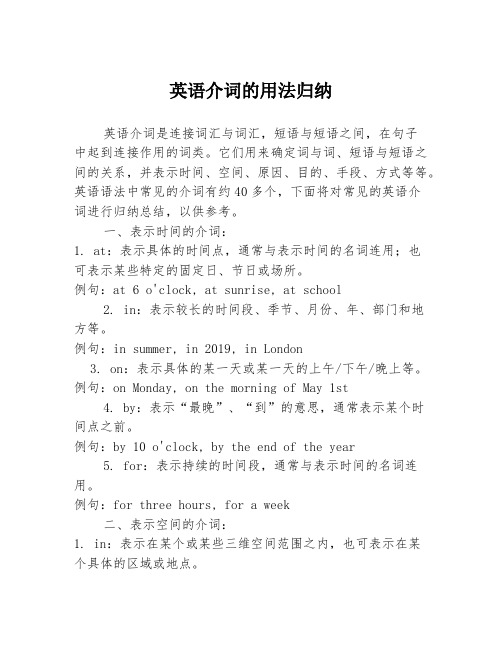
英语介词的用法归纳英语介词是连接词汇与词汇,短语与短语之间,在句子中起到连接作用的词类。
它们用来确定词与词、短语与短语之间的关系,并表示时间、空间、原因、目的、手段、方式等等。
英语语法中常见的介词有约40多个,下面将对常见的英语介词进行归纳总结,以供参考。
一、表示时间的介词:1. at:表示具体的时间点,通常与表示时间的名词连用;也可表示某些特定的固定日、节日或场所。
例句:at 6 o'clock, at sunrise, at school2. in:表示较长的时间段、季节、月份、年、部门和地方等。
例句:in summer, in 2019, in London3. on:表示具体的某一天或某一天的上午/下午/晚上等。
例句:on Monday, on the morning of May 1st4. by:表示“最晚”、“到”的意思,通常表示某个时间点之前。
例句:by 10 o'clock, by the end of the year5. for:表示持续的时间段,通常与表示时间的名词连用。
例句:for three hours, for a week二、表示空间的介词:1. in:表示在某个或某些三维空间范围之内,也可表示在某个具体的区域或地点。
例句:in the room, in the park2. on:表示在某个平面面上,通常用来表示地点。
例句:on the table, on the wall3. at:表示在某个具体的地点或位置。
例句:at the door, at the bus stop4. by:表示“靠近”、“经过”等含义。
例句:by the river, by the window5. between:表示在两个或两个以上的物体或位置之间。
例句:between two mountains, between the buildings6. among:表示在三个或三个以上的物体或位置之间。
英语介词用法整理总结(超全面)
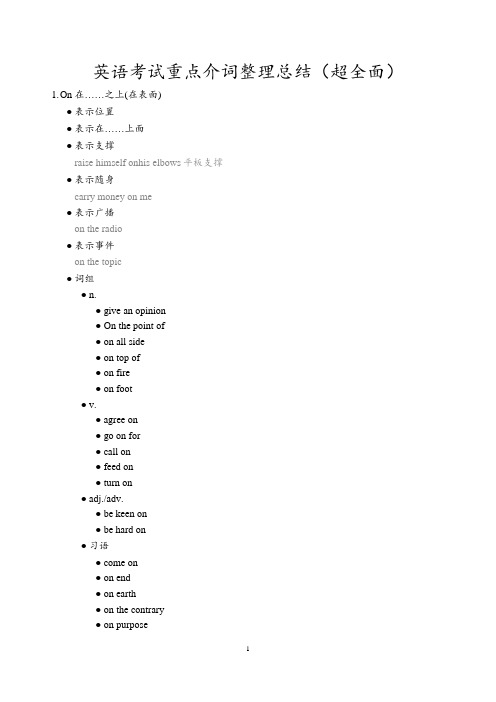
英语考试重点介词整理总结(超全面)1.O n 在……之上(在表面)●表示位置●表示在……上面●表示支撑raise himself onhis elbows平板支撑●表示随身carry money on me●表示广播on the radio●表示事件on the topic●词组●n.●give an opinion●On the point of●on all side●on top of●on fire●on foot●v.●agree on●go on for●call on●feed on●turn on●adj./adv.●be keen on●be hard on●习语●come on●on end●on earth●on the contrary●on purpose2.I n 在……里面●含义●表示位置●表示在作品中is the book●表示时间段●在状态in the trouble●表示方式in English , in print●表示穿着in a suit●词组●n.●arm in arm●a case in point一个典型的例子●in a hurry●in detail●in turn●in spite of●v.●abound in●get in touch with●keep in touch●adj/adv.●be abound in●be absorbed in专心致力于……3.A t 在(一个点)●含义●表示地点/场所●在旁边at the table●表示距离at certain distance, at an angle●表示时刻at 3am.●表示年龄at the age of 17●词组●at bottom●glance at●run out of 达到(某数字)●feel amused at●not at all4.o f 属于……的●含义●表示特征the aim of the course●表示从属特点Bank of China●表示数量a piece of paper●表示动作building of house●词组●n.●take advantage of●back of●take care of●v.●accuse sb. ofsth.●consist of●die of●adj./adv.●ahead of●be afraid of●be full of5.f or 为了●6.b y 依靠●含义●表示人He was brought up by his father.●表示手段by car●表示巧合I met by chance.碰运气。
英语介词用法最全总结
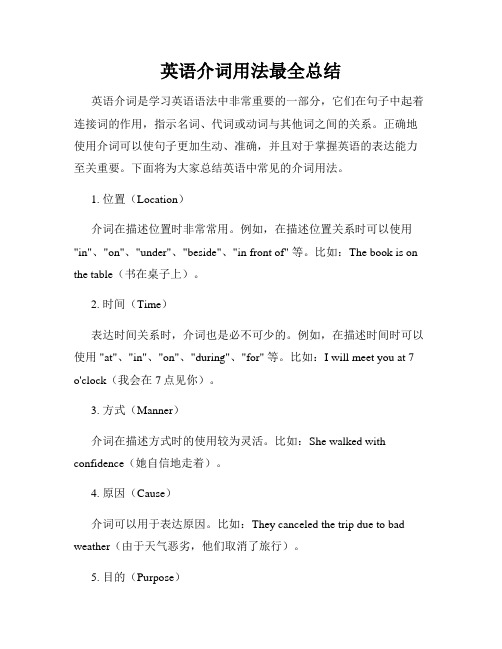
英语介词用法最全总结英语介词是学习英语语法中非常重要的一部分,它们在句子中起着连接词的作用,指示名词、代词或动词与其他词之间的关系。
正确地使用介词可以使句子更加生动、准确,并且对于掌握英语的表达能力至关重要。
下面将为大家总结英语中常见的介词用法。
1. 位置(Location)介词在描述位置时非常常用。
例如,在描述位置关系时可以使用"in"、"on"、"under"、"beside"、"in front of" 等。
比如:The book is on the table(书在桌子上)。
2. 时间(Time)表达时间关系时,介词也是必不可少的。
例如,在描述时间时可以使用 "at"、"in"、"on"、"during"、"for" 等。
比如:I will meet you at 7 o'clock(我会在7点见你)。
3. 方式(Manner)介词在描述方式时的使用较为灵活。
比如:She walked with confidence(她自信地走着)。
4. 原因(Cause)介词可以用于表达原因。
比如:They canceled the trip due to bad weather(由于天气恶劣,他们取消了旅行)。
5. 目的(Purpose)介词也能表达目的。
比如:He went to the store to buy some groceries (他去商店买些食品)。
6. 所属关系(Possession)介词可以用于表达所属关系。
比如:This book belongs to me(这本书是我的)。
7. 比较(Comparison)在进行比较时,介词也可以派上用场。
比如:I am taller than my sister(我比我妹妹高)。
超全的英语介词用法归纳总结
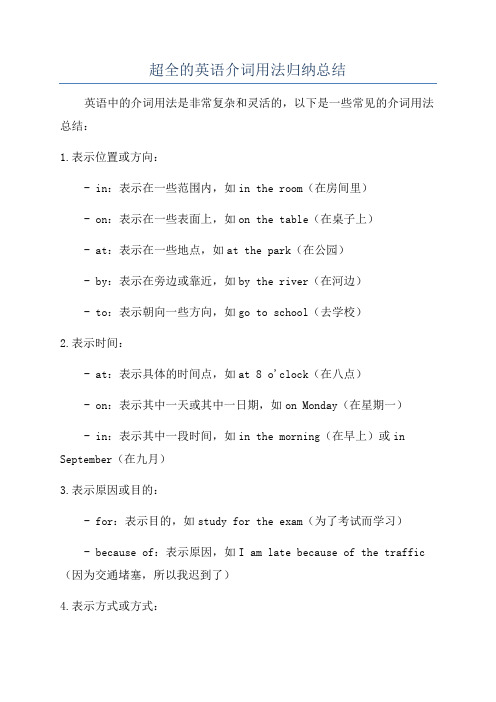
超全的英语介词用法归纳总结英语中的介词用法是非常复杂和灵活的,以下是一些常见的介词用法总结:1.表示位置或方向:- in:表示在一些范围内,如in the room(在房间里)- on:表示在一些表面上,如on the table(在桌子上)- at:表示在一些地点,如at the park(在公园)- by:表示在旁边或靠近,如by the river(在河边)- to:表示朝向一些方向,如go to school(去学校)2.表示时间:- at:表示具体的时间点,如at 8 o'clock(在八点)- on:表示其中一天或其中一日期,如on Monday(在星期一)- in:表示其中一段时间,如in the morning(在早上)或in September(在九月)3.表示原因或目的:- for:表示目的,如study for the exam(为了考试而学习)- because of:表示原因,如I am late because of the traffic (因为交通堵塞,所以我迟到了)4.表示方式或方式:- with:表示使用一些工具或伴随人物,如write with a pen(用笔写)或go with me(和我一起去)- by:表示通过其中一种方式,如send a message by email(通过邮件发送信息)5.表示归属关系:- of:表示所属关系,如a friend of mine(我的朋友)6.表示比较或对比:- than:表示比较,如He is taller than me(他比我高)7.表示条件或目的:- for:表示目的或为了,如I study hard for a good grade(为了获得好成绩,我努力学习)以上仅是一些常见的介词用法总结,介词在不同的语境中可能有不同的意义和用法。
因此,在使用介词时需要根据具体情境进行理解和运用。
(完整版)介词用法大全
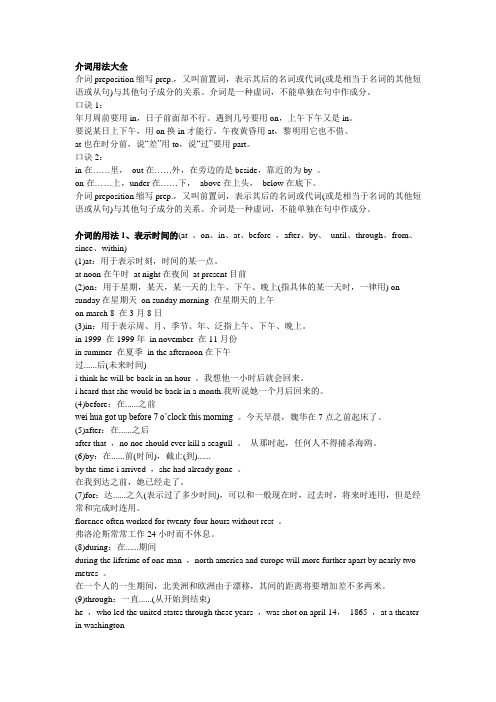
介词用法大全介词preposition缩写prep.,又叫前置词,表示其后的名词或代词(或是相当于名词的其他短语或从句)与其他句子成分的关系。
介词是一种虚词,不能单独在句中作成分。
口诀1:年月周前要用in,日子前面却不行。
遇到几号要用on,上午下午又是in。
要说某日上下午,用on换in才能行。
午夜黄昏用at,黎明用它也不借。
at也在时分前,说“差”用to,说“过”要用part。
口诀2:in在……里,out在……外,在旁边的是beside,靠近的为by 。
on在……上,under在……下,above在上头,below在底下。
介词preposition缩写prep.,又叫前置词,表示其后的名词或代词(或是相当于名词的其他短语或从句)与其他句子成分的关系。
介词是一种虚词,不能单独在句中作成分。
介词的用法1、表示时间的(at 、on、in、at、before ,after、by、until、through、from、since、within)(1)at:用于表示时刻,时间的某一点。
at noon在午时at night在夜间at present目前(2)on:用于星期,某天,某一天的上午、下午、晚上(指具体的某一天时,一律用) on sunday在星期天on sunday morning 在星期天的上午on march 8 在3月8日(3)in:用于表示周、月、季节、年、泛指上午、下午、晚上。
in 1999 在1999年in november 在11月份in summer 在夏季in the afternoon在下午过......后(未来时间)i think he will be back in an hour 。
我想他一小时后就会回来。
i heard that she would be back in a month.我听说她一个月后回来的。
(4)before:在......之前wei hua got up before 7 o’clock this morning 。
(详细版)介词的用法总结
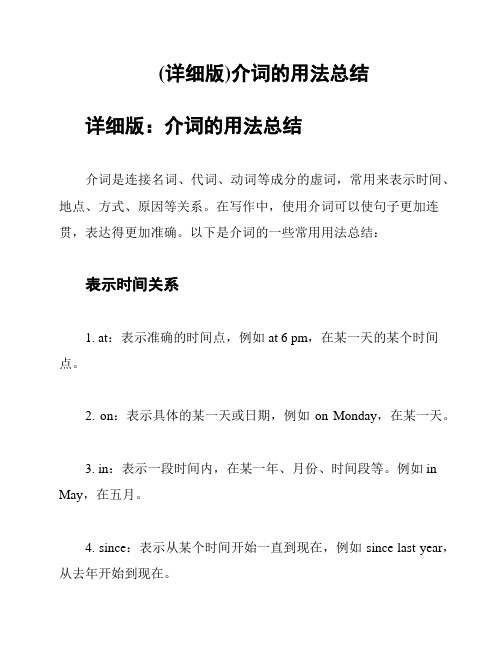
(详细版)介词的用法总结详细版:介词的用法总结介词是连接名词、代词、动词等成分的虚词,常用来表示时间、地点、方式、原因等关系。
在写作中,使用介词可以使句子更加连贯,表达得更加准确。
以下是介词的一些常用用法总结:表示时间关系1. at:表示准确的时间点,例如 at 6 pm,在某一天的某个时间点。
2. on:表示具体的某一天或日期,例如on Monday,在某一天。
3. in:表示一段时间内,在某一年、月份、时间段等。
例如 in May,在五月。
4. since:表示从某个时间开始一直到现在,例如 since last year,从去年开始到现在。
5. for:表示持续的时间,在某段时间内。
例如 for two hours,持续两个小时。
表示地点关系1. at:表示在某个位置。
例如 at home,在家。
2. on:表示在一个平面面上。
例如 on the table,在桌子上。
3. in:表示在一个封闭的空间内。
例如in the room,在房间里。
4. to:表示到某个地方。
例如 go to school,去学校。
表示方式、原因、目的等关系1. by:表示通过某种方式。
例如 by plane,乘飞机。
2. with:表示用某种工具或伴随某人物。
例如 write with pen,用笔写。
3. for:表示为了某种目的。
例如 for health,为了健康。
4. because of:表示因为某种原因。
例如 because of the rain,因为下雨。
以上只是介词用法的一部分,需要灵活运用,不要生搬硬套,以免出现错误。
希望以上总结对您有所帮助。
介词 超全的英语介词用法归纳总结~优秀6篇
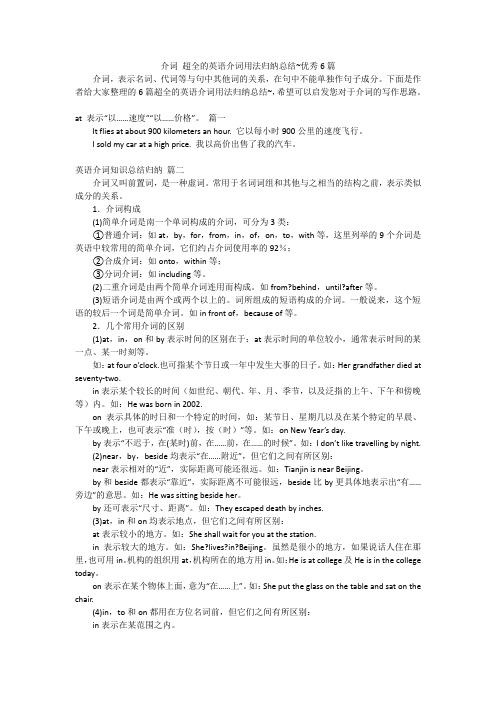
介词超全的英语介词用法归纳总结~优秀6篇介词,表示名词、代词等与句中其他词的关系,在句中不能单独作句子成分。
下面是作者给大家整理的6篇超全的英语介词用法归纳总结~,希望可以启发您对于介词的写作思路。
at 表示“以……速度”“以……价格”。
篇一It flies at about 900 kilometers an hour. 它以每小时900公里的速度飞行。
I sold my car at a high price. 我以高价出售了我的汽车。
英语介词知识总结归纳篇二介词又叫前置词,是一种虚词。
常用于名词词组和其他与之相当的结构之前,表示类似成分的关系。
1.介词构成(1)简单介词是南一个单词构成的介词,可分为3类:①普通介词:如at,by,for,from,in,of,on,to,with等,这里列举的9个介词是英语中较常用的简单介词,它们约占介词使用率的92%;②合成介词:如onto,within等;③分词介词:如including等。
(2)二重介词是由两个简单介词连用而构成。
如from?behind,until?after等。
(3)短语介词是由两个或两个以上的。
词所组成的短语构成的介词。
一般说来,这个短语的较后一个词是简单介词。
如in front of,because of等。
2.几个常用介词的区别(1)at,in,on和by表示时间的区别在于:at表示时间的单位较小,通常表示时间的某一点、某一时刻等。
如:at four o’clock.也可指某个节日或一年中发生大事的日子。
如:Her grandfather died at seventy-two.in表示某个较长的时间(如世纪、朝代、年、月、季节,以及泛指的上午、下午和傍晚等)内。
如:He was born in 2002.on表示具体的时日和一个特定的时间,如:某节日、星期几以及在某个特定的早晨、下午或晚上,也可表示“准(时),按(时)”等。
- 1、下载文档前请自行甄别文档内容的完整性,平台不提供额外的编辑、内容补充、找答案等附加服务。
- 2、"仅部分预览"的文档,不可在线预览部分如存在完整性等问题,可反馈申请退款(可完整预览的文档不适用该条件!)。
- 3、如文档侵犯您的权益,请联系客服反馈,我们会尽快为您处理(人工客服工作时间:9:00-18:30)。
介词的用法一、表示时间日期的介词1.at:主要表示方向、场所、时间的某一点at the corner of the street,at dinner,at sixty miles an hour,be sold at three yuan a dozen,come at us固定搭配:at one time,at the beginning of,at the post office,at the airport,at the weekend,at the age of25,at the same time,at present,at any time,表示原因,表示“见/闻……而”。
at the news at主要表示时间点表示特定的时间at night a.m.在九点钟表示不确定的时间at night,at that time,at Christmas 在圣诞期间当天on表示年龄段at the age of eight在8岁2.in:表示场所、时间与期限、状况、方向。
主要用来表示较长的时间单位,如月份、季节、年份等in the1990s in the late19th century形成“in+时段名词”的词组或固定搭配in those days,in the daytime,in a short while,in no time,in time.in主要表示时间段一般指相对较长的时间段里in the morning,in spring,in the past ten years在…时间之后,用于将来时He will be back in a month.介词in在短语或句型中的省略:1)某些形容词/过去分词后接v-ing形式时,v-ing形式前的介词in可以省略。
be busy(in)doing be engaged(in)doing(忙于……)2)某些动词如busy等,常与反身代词连用,其后的in也可以省略。
busy oneself(in)doing3)某些动词如spend、pass、waste等与表示时间的名词连用,后面的介词也可以省略。
spend time(in)doing waste time(in)doing4)在have no difficulty in doing sth.、have no trouble in doing sth.、have no business in doing sth.等句型中介词也可以省略。
5)在句型There is no use(in)doing sth.中,介词也可省略。
固定搭配:in the world,in(the)future,in the snow/rain/storm,in ink,in short,in public,in one’s opinion,in modern times,in surprise,in a queue,in the open air3.on:主要表示在上面、根据或基础、有关或涉及的方面、表示某天。
固定搭配:on doing sth.,on the afternoon of October,on Tuesday evening,on foot,hit sb.on the head,on the right/left,on fire,on duty,on sale,on the radio,on show,on earth,on one’s own注意:一般带有宗教色彩的节日名词前面用at,如圣诞节。
一般的节日名词前用on。
on主要指具体某一天表示是具体的日期和星期on Monday,on October1st,1949.on my birthday某一天特定的上午下午或半夜on the night of December31,1999.on a fine day在第几天on her first day to school,on the tenth day I was in Beijing.4.by主要表示接近、时限、动作的执行者、方式。
固定搭配:by the village,by oneself,by foot(=on foot),by hand,learn…by heart,二、表示地点,方位的介词5.for主要表示目的、原因、交换值以及时间和距离的长度。
固定搭配:make sth.for sb.,thank sb.for sth.,for example,for sale,for free,for表示一段时间表示一件事延续的长短,一般接具体的时间I have lived in Nanjing for2years.6.of表示部分与全体的关系、所有关系、来源和所用的材料。
of所有格表示的多种关系:1)从属关系:the wheel of the car2)局部----整体关系:some of the water3)量化关系:a cup of tea4)描述关系:a professor of learning(知识丰富的教授)5)同位关系:the city of Beijing6)动宾关系:the study of the map(研究地图)7)主谓关系:the determination of the workers(工人们的决心)固定搭配:be fond of,make fun of,be tired of,of one’s own,instead of,7.to主要表示方向、程度、结果、关系和位置。
固定搭配to one’s surprise/joy/astonishment,to the east of,key to…,come up to,add up to,be open to the public,thanks to,stick to,refer to8.during表示一段时间在…期间内,强调在此期间内发生了什么事yI studied in this university for4years,during that time most of my time was spent in learning E nglish.可接表示时间延续一段时间的名词during my visit to China,during my holiday9.from与to,till连用Most people work from nine to five.多数人过着朝九晚五的生活10.since,since+时间点从那一刻起,与现在完成与过去完成时连用He has been here since last Sunday.自从上星期天起,她就在这里四、容易错、常考的介词及搭配1.be made of,be made from,be made into,be made in2.call on=visit,call for=go and pick up3.on business(出差)/strike()罢工/duty(值日)/holiday/fire/vacation/watch(警戒)/sale(出售)/leave(请假)/guard(警戒)4.have some trouble/difficulty(in)doing sth.,have a habit/idea/plan of doing sth.5.A is pleased to B,B is pleased with A(对……感到满意)7.with the help of,under the leadership of8.by means of(使用),by way of(经由),by heart(记住),by the way9.out of question(毫无疑问),out of the question(毫不可能)10.prevent/stop/keep sb.from doing sth.11.be thankful to sb.for sth.12.steal sth.from sb.,rob sb.of sth.13.insist on doing sth.,persist in doing sth.,stick to,go on doing sth.14.set about doing sth.,set out to do sth.15.look sb.in the face,hit sb.on the face,lead the cow by the nose16.do a favour for sb.=do sb.a favour五、介词的惯用型1.above all(首先),after all,at all(全然),in all2.day after day,year after year,one after one,one after another3.at peace(和平),at war(战争),at times(时常),at dinner4.by oneself,by all means(尽一切办法、务必),by chance,by accident,by no means(决不、并没有),by means of(用、依靠),by the way5.in her teens(十几岁),in pain,in danger,in need6.to one’s joy/sorrow/surprise7.with care(仔细地),with joy/pleasure(高兴地),with one’s help,with the best wishes (致以我们良好的祝愿),without difficulty(毫不困难地),without exception(毫不例外),without delay(立即、马上)8.according to(依据),along with(和……一起),as to(至于……),because of,except for (除……之外),instead of(代替)9.out of order(不正常),out of date,out of trouble(脱离困境),out of sight,out of debt (还清了债务),out of touch(没有联系)10.at the bottom of,at the centre of,at the end of,at the top of,at the cost of(以……为代价)at the sight of,at the thought of,at a speed of11.in memory of(纪念),in favour of(同意),in the habit of(有……习惯),in touch with (与……保持联系),on the left of,on the eve of(在……前夕)2.from time to time(不时地),from day to day(天天),from hand to hand(一个传一个),from side to side(左右地),from car to car(一个车厢一个车厢地),from bad to worse(越来越差),from beginning to end (从头到尾),from hand to mouth(仅能糊口),from head to foot,from start to finish,from one to another六.掌握方式、手段、工具的表达方法1)in+文字、语言、材料名词in English(ink,pencil,capital letters)write in pen,用钢笔写speak in a low voice小声说话2)with+工具、机器;人体器官;情绪、情感、态度的名词with a branch,with one’s nose,with pride,with satisfaction,with the help of,with one’s permissionWe can see with our eyes and write with our hands.I killed a fly with a fly flap.我用苍蝇拍打死了一只苍蝇3)by表示泛指的方式、手段by bus,by land,by means of(用……方法),by way of(经由),by doing sth.,by hand(手工),by post(由邮局传递),by letter(用写信的方式),by electricity,by hard work,by the year,by the hour(by+the+单位名词)按……4)其它表示方式(情况、状况、手段)的表示法through the radio/by radio/on the radio,through/by/from practice,by telephone(on the telephone),on foot,on the train,in satisfaction,in surprise,in silence,in a l ow voice,in comfort,in sorrow,in high/good/poor spirits,in anger,in safety,in debt,in good order,in good/poor health,in tears,in use,in pain,七、注意:某些名词和介词的固定搭配1)要求to:key,answer,visit,apology,introduction以to为中心构成短语的归纳belong to,come to(苏醒),look forward to,lead to,stick to,refer to,turn to,drink to(为……干杯),object to(反对),reply to the letter,help oneself to,sing/dance to the music(和着……在……声中唱/跳),devote oneself to2)要求in:interest,satisfaction3)以for为中心构成短语的归纳ask for,call for(去接某人),care for(关心),go in for(从事),answer for(对……负责),send for,pay for,praise sb.for(赞扬某人某事),head for(向……方向移动),search for,take…for…(误以为),leave for,prepare for(为……准备),thank sb.for,make a dive for(向……猛冲),make up for(弥补……损失)4)以on为中心构成短语的归纳come on来吧,call on拜访,pass on传递,carry on进行下去,live on sth.靠……生活,depend on 依靠,have on穿着,have pity on同情,look on…as…把……看作,push on推动,spy on窥探,switch/turn on旋开,wait on服侍,walk on继续走,spend…on…在……上花费时间、金钱,operate on给……动手术,take on a new look呈现新面貌八、某些形容词和介词的固定搭配1)be afraid of担心be afraid for替……而担心2)be angry about/at sth.因……而生气be angry with sb.对……某人发怒3)be anxious for sth.渴望be anxious about sth./sb.担心4)be different from与……不同be indifferent to………不关心5)be good at…擅长be good for…对……有益be good of sb.to do sth.友好6)be strict with sb.对……严格be strict in sth.7)be popular with sb.受到……欢迎be popular in some place流行在……be popular for 因……而流行8)be pleased with+n.或what从句;be pleased at+抽象名词听、看到而高兴9)be disappointed at sth.;be disappointed with sb.对……失望10)be known to sb.;be known with+n.或从句;be known for因……而著名11)be absent from缺席12)be devoted to…献身于……13)be open to…对……开放14)be poor/clever/expert at…15)be sorry for…替/为……后悔16)be rich in…be interested in…17)be proud of(take pride in)18)be satisfied with/by…be sure of/about…19)be fond of,be fit for,be busy with sth.(in doing sth.)20)be late for,be ready for21)be similar to…;be wrong with…九、吊尾介词1)某些形容词后接不及物动词或“V+介”型短语动词的不定式形式表“反射”,常用吊尾介词。
